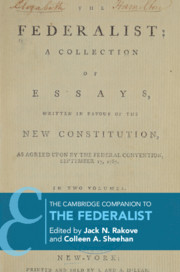Book contents
- The Cambridge Companion to The Federalist
- Other Volumes in the Series of Cambridge Companions to Philosophy
- The Cambridge Companion to The Federalist
- Copyright page
- Contents
- Contributors
- Acknowledgments
- Abbreviations
- Introduction
- 1 Publius and the Anti-Federalists:
- 2 John Jay, The Federalist, and the Constitution
- 3 “A Vigorous National Government”: Hamilton on Security, War, and Revenue
- 4 “The Known Opinion of the Impartial World”
- 5 The Federalist’s New Federalism
- 6 The Political Psychology of Publius
- 7 Montesquieu, Hume, Adam Smith, and the Philosophical Perspective of The Federalist
- 8 Madison’s Republican Remedy
- 9 The Republicanism of Publius
- 10 “The Interest of the Man”: James Madison’s Constitutional Politics
- 11 Politics Indoors and Out-of-Doors
- 12 “The Cool and Deliberate Sense of the Community”
- 13 Publius on Monarchy
- 14 The Genius of Hamilton and the Birth of the Modern Theory of the Judiciary
- 15 Publius’s Political Science
- 16 The Republican Form of Government in The Federalist
- Index
- Other Volumes in the Series of Cambridge Companions to Philosophy
12 - “The Cool and Deliberate Sense of the Community”
The Federalist on Congress
Published online by Cambridge University Press: 28 February 2020
- The Cambridge Companion to The Federalist
- Other Volumes in the Series of Cambridge Companions to Philosophy
- The Cambridge Companion to The Federalist
- Copyright page
- Contents
- Contributors
- Acknowledgments
- Abbreviations
- Introduction
- 1 Publius and the Anti-Federalists:
- 2 John Jay, The Federalist, and the Constitution
- 3 “A Vigorous National Government”: Hamilton on Security, War, and Revenue
- 4 “The Known Opinion of the Impartial World”
- 5 The Federalist’s New Federalism
- 6 The Political Psychology of Publius
- 7 Montesquieu, Hume, Adam Smith, and the Philosophical Perspective of The Federalist
- 8 Madison’s Republican Remedy
- 9 The Republicanism of Publius
- 10 “The Interest of the Man”: James Madison’s Constitutional Politics
- 11 Politics Indoors and Out-of-Doors
- 12 “The Cool and Deliberate Sense of the Community”
- 13 Publius on Monarchy
- 14 The Genius of Hamilton and the Birth of the Modern Theory of the Judiciary
- 15 Publius’s Political Science
- 16 The Republican Form of Government in The Federalist
- Index
- Other Volumes in the Series of Cambridge Companions to Philosophy
Summary
The American civic canon holds that the Constitution creates three branches of government that are both separate and “equal.” Publius’s essays on Congress cast serious doubt on this supposition, at least with respect to the extent of each branch’s influence on the workings of the national regime. It is no mistake that both the Constitution and The Federalist treat Congress as the first branch of government. It is “justly regarded” as such, Louis Fisher says, primarily because of the appropriations power elucidated in Federalist 58. The Federalist understands Congress, George W. Carey writes, “to be the heart of the proposed system.” Even the doubts and concerns that Publius expresses about Congress reflect regard for its authority. Federalist 51, for example, acknowledges that the legislature “necessarily predominates” (Fed. 51, 350) in a republic, but it also seeks a remedy for the “inconveniency” this poses to the separation of powers. Institutionally, Congress has the power both to constitute and discipline the other branches, which have no comparable authority over it. Even when defending executive energy, Publius describes it as secondary to legislative deliberation. The centrality of the legislative branch is demonstrable not only institutionally but also theoretically, for it is here that Publius places his greatest hopes for solving one of his most fundamental problems: the reconciliation of a government with sufficient authority and energy on the one hand, with the preservation of both public and personal liberty, on the other – a concern that Hamilton and Madison respectively expressed in Federalist 1 and 37.
- Type
- Chapter
- Information
- The Cambridge Companion to The Federalist , pp. 400 - 425Publisher: Cambridge University PressPrint publication year: 2020

